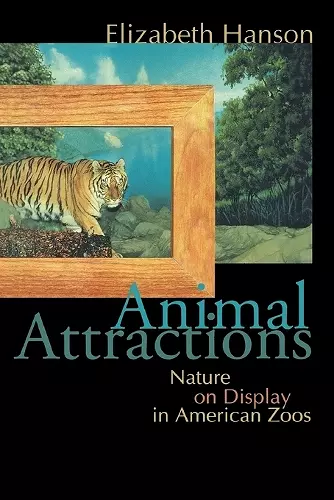Animal Attractions
Nature on Display in American Zoos
Format:Paperback
Publisher:Princeton University Press
Published:12th Mar '04
Currently unavailable, and unfortunately no date known when it will be back

Elizabeth Hanson's Animal Attractions is much more than a history of zoological parks, it is rather a phenomenology of zoos and zoo people. -- Terry Maple, Director, Zoo Atlanta Hanson's finely crafted chronicle of the American zoo traces the perennial struggle between the need to entertain, the desire to educate, and the yearning for natural and scientific authenticity that surrounds the public exhibition of wild animals in captivity. Animal Attractions is essential reading for anyone with an interest in zoos and their history. -- James Serpell, author of In the "Company of Animals: A Study of Human-Animal Relationships" This thoroughly researched book explores the cultural and physical landscapes of America's zoos in fascinating detail. Hanson follows the progress--and the pitfalls--of every aspect of their journey from menageries to centers of conservation. She unflinchingly examines the wretched and the wonderful, the mediocre and the magnificent, and along the way she asks intelligent questions and reveals intriguing insights into an institution that is rarely examined with any seriousness. -- David Hancocks, Director, Victoria's Open Range Zoo This is an innovative, well-researched, engagingly written, and important study of the cultural history of zoos in America. Hanson is the first to tackle this rich subject in a book, and what she achieves is impressive. -- Richard Burkhardt, author of "The Spirit of System" Animal Attractions provides a fascinating, behind-the-scenes look at an important but historically neglected institution: the American zoo. Anyone who has ever enjoyed a day at the zoo will want to read this book to learn more about why we find the experience so compelling. -- Mark V. Barrow, author of "A Passion for Birds"
A history of American zoos, this work examines the meaning of nature in the city by looking at the ways zoos have assembled and displayed their animal collections.On a rainy day in May 1988, a lowland gorilla named Willie B. stepped outdoors for the first time in twenty-seven years, into a new landscape immersion exhibit. Born in Africa, Willie B. had been captured by an animal collector and sold to a zoo. During the decades he spent in a cage, zoos stopped collecting animals from the wild and Americans changed the ways they wished to view animals in the zoo. Zoos developed new displays to simulate landscapes like the Amazon River basin and African forests. Exhibits similar to animals' natural habitats began to replace old-fashioned animal houses. But such displays are only the most recent effort of zoos to present their audiences with an authentic experience of nature. Since the first zoological park opened in the United States in Philadelphia in 1874, zoos have promised their visitors a journey into the natural world. And for more than a century they have been popular places for education and recreation: every year more than 130 million Americans go to zoos to look at the animals and enjoy a day outdoors. The first book-length history of American zoos, Animal Attractions examines the meaning of nature in the city by looking at the ways zoos have assembled and displayed their animal collections. Situated literally and culturally in the American middle landscape, zoos are concrete expressions of longstanding tensions between wildness and civilization, science and popular culture, education and entertainment. In their efforts to promote nature appreciation, they reveal much about how our culture envisions the natural world and the human place in it and how these ideas have changed.
"An excellent summary of an often-ignored subject... Hanson covers the social evolution of how we have seen zoos, and delves into changes in how zoos see themselves."--Adrian Barnett, New Scientist "Taking the kids to the zoo is as much a Sunday afternoon ritual as watching the NFL on television. But while the zoo is a pretty common experience, it is also an unsettling idea, causing the human animal to feel uncomfortable... The ideas that sustained [zoos] were, as Elizabeth Hanson explains in Animal Attractions, progressive. These were not seedy, sideshow affairs where you went for cheap thrills but places for 'recreation, self improvement and spiritual renewal.'"--Geoffrey Norman, Wall Street Journal "If ever a book lived up to its title and subtitle, this one, an interesting and readable history of zoos and influences on their development in the US, certainly does."--Choice "This book is rich in striking examples... [It] leaves readers with a clear appreciation of the pressures that shaped American zoos in the past and continue to drive innovations in display today."--Elizabeth Blackmar, American Historical Review "Animal Attractions carefully and importantly contextualizes the zoo amidst broader developments in American culture... [A]n important contribution to the vital rethinking of zoos and urban space and the relationship of nature and culture in modern America."--Brett Mizelle, Journal of American History "Animal Attractions is an enjoyable overview of zoo cultural history, and will be of interest to scientific and cultural historians, as well as anyone curious about the context of what they are seeing during a day at the zoo."--Lisa Faust, Quarterly Review of Biology
ISBN: 9780691117706
Dimensions: unknown
Weight: 340g
256 pages